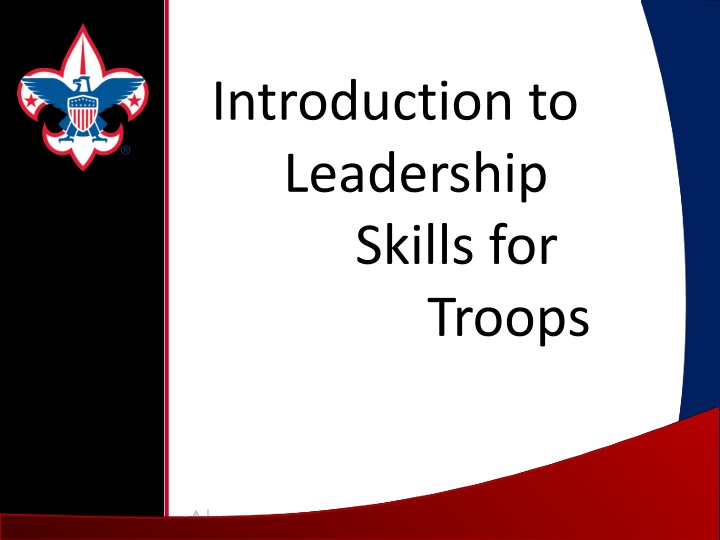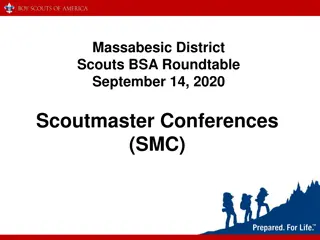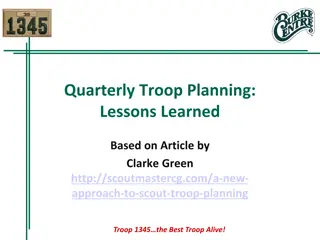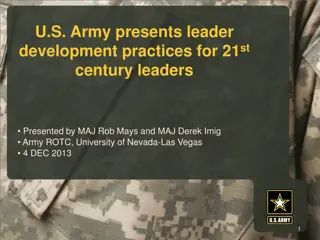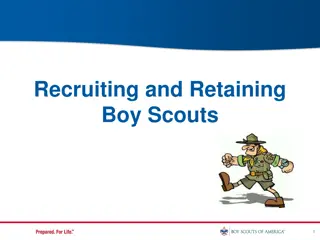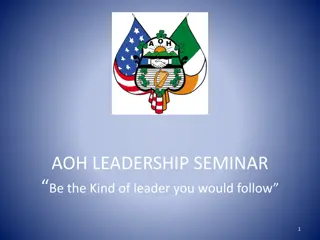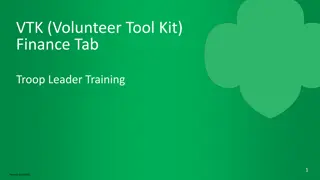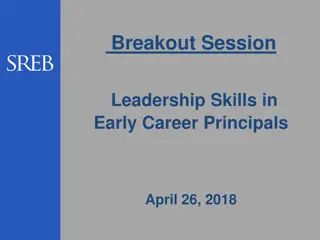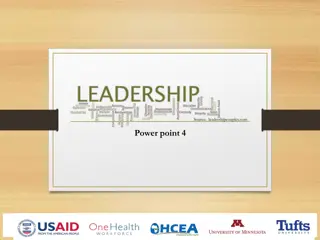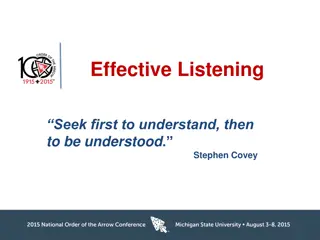Troop Leadership Skills: Building Strong Teams & Effective Leaders
Explore Troop Organization, Tools of the Trade, and Leadership & Teamwork in this course preparing troops for success. Understand the course vision and the progression from ILST to NYLT to NAYLE. Uncover the importance of staff and participant introductions, and delve into the core questions of who we are, who you are, and why we are here.
Download Presentation

Please find below an Image/Link to download the presentation.
The content on the website is provided AS IS for your information and personal use only. It may not be sold, licensed, or shared on other websites without obtaining consent from the author.If you encounter any issues during the download, it is possible that the publisher has removed the file from their server.
You are allowed to download the files provided on this website for personal or commercial use, subject to the condition that they are used lawfully. All files are the property of their respective owners.
The content on the website is provided AS IS for your information and personal use only. It may not be sold, licensed, or shared on other websites without obtaining consent from the author.
E N D
Presentation Transcript
Introduction to Leadership Skills for Troops
Welcome Staff Introductions Course Description 1.Troop Organization 2.Tools of the Trade 3.Leadership & Teamwork Course Vision ILST -> NYLT -> NAYLE
Welcome Who are we? Who are you? Why are we here? What is our purpose? What is our job? How can we lead?
Name? From ? Troop ? Something unique about You.
Course Vision Mission Statement The mission of the Boy Scouts of America is to prepare young people to make ethical and moral choices over their lifetimes by instilling in them the values of the Scout Oath and Law. Training boy leaders to run their troop is the Scoutmaster's most important job. Train Scouts to do a job, then let them do it. Never do anything a boy can do. Robert S. S. Baden-Powell
Scouting Provides Life Skills in a Values-Based Environment Scouting is a values-based program with its own code of conduct. The Scout Oath and Law help instill the values of good conduct and honesty. A boy who spends one year in a Scout troop will learn lifetime skills. He will learn basic outdoor skills, self-reliance, and how to get along with others. Scouting will prepare him to live a more productive and fulfilling life.
Youth Leadership ILST = Introduction to Leadership Skills for Troops NYLT = National Youth Leadership Training NAYLE = National Advanced Youth Leadership Experience ILST -> NYLT -> NAYLE
A question True or False? By accepting a position of Troop Leadership, you are automatically a good leader.
What makes a Trained Leader? For youth leaders in a Troop, completion of this course is the first step in your training. A better question; What makes a good leader? We will explore this question in our course today.
MODULE ONE: UNIT ORGANIZATION
What is a Unit? How is it Organized? A Unit is a group of similar objects or individuals. In Scouting a Unit is a Troop, Team, or Crew. A Troop is made of a Scouts, Leaders, Parents, and a Chartering Organization. A Troop s youth are organized into smaller units called Patrols.
Order of the Arrow Troop Representative
Junior Assistant Scoutmaster (JASM)
Time for a break!
Assistant Scoutmaster (ASM) To fulfill his or her obligation to the troop. The Scoutmaster, with the assistance of the Troop Committee recruits assistant Scoutmaster Each assistant Scoutmaster is assigned specific program duties and reports to the scoutmaster. They also provide the two-deep leadership required by the BSA An assistance Scoutmaster may be 18 years old, but at least one in each troop should be 21 or older so he or she can serve in the scoutmaster s absence
Troop Committee Chairman & Members Committee Chairman Recruits and approves Scoutmaster and Committee Committee Members Treasure Training Outing Coordinator Scribe Serves as a resource to the troop Works with an assigned Officer Recruits consultants
Troop Chartered Organization Representative Serves as the liaison between the troop and the Chartered organization Helps Recruits the Troop Committee Approves Scoutmaster Participates in the district Leadership
The Scout-Led Troop Empowering Scouts to become leaders is the core of the Scouting program. The patrol method is not a way to operate a Boy Scout troop, it is the only way. Unless the patrol method is in operation, you don't really have a Boy Scout troop. Robert S. S. Baden-Powell
Patrol Leaders Council (PLC) Run by Senior Patrol Leader Youth leaders plan the activities of the Troop with guidance from the Scoutmaster and other trained adults.
What are qualities of a Leader? Discuss in your groups.
What is the best kind of leadership? Discuss in your group.
What is the best kind of leadership? Being a boss I tell you, you go do it. Setting an example I ll show you, then you do it. Servant Leadership Let s go do it together.
Servant Leadership It is a choice to lead. It is about a choice to give rather than to receive. Servant Leaders are more concerned with the success of the group than any one individual. It is about putting others and the group first.
Time for a break!
MODULE TWO: TOOLS OF THE TRADE
Communications Sender Message Receiver The basic model of all communications. The sender must make the message clear to the receiver for information to be understood.
A Test of Communication The Telephone Game
Tools for Communication In Person Telephone Mail E-mail Text Message Other digital methods: Websites Social Media
